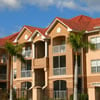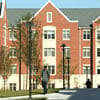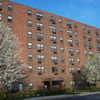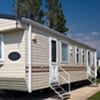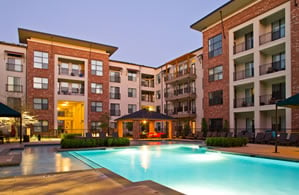
Fannie Mae Multifamily Mortgages
The Fannie Mae Multifamily Loan Program is one of the most utilized funding resources for apartment owners nationwide because of its attractive interest rates, variety of loan structure options, high loan-to-values, and non-recourse guaranty structure. With both fixed and floating rate options available, it is a great product for most multifamily property types, including affordable housing, senior independent living, student housing, cooperative housing, traditional market rate apartments, and manufactured housing. It can also be used for mixed-use buildings where the other commercial units make up 20% or less of the gross income. For those looking to compare the current Fannie Mae Multifamily interest rates to other multifamily products, it can be done on our apartment interest rates page.
Fannie Mae Multifamily Programs
Fannie offers both fixed and variable products for all property types and can go nationwide, although primary and large secondary markets are preferred (i.e. MSA populations of at least 200,000). There are 2 major FNMA programs under which the majority of the products fall:
Standard DUS Mortgage: The Standard DUS product is for the purchase or refinance of existing, stabilized properties with 5+ units that have a minimum loan amount of $5 million (or $7 million in eligible markets*).
Small Loan Program: The Small Loans product is for the purchase or refinance of existing, stabilized properties with 5-50 units and loan amounts between $750,000 - $5 million ($7 million in eligible markets*).
* Eligible markets are Baltimore, Boston, Chicago, Los Angeles, New York, Sacramento, San Diego, San Francisco, San Jose, Seattle, Washington D.C.
General Loan Features
| FNMA Feature Overview | |
| Eligible Properties |
Market-Rate (Conventional) Apartments Affordable Housing Senior Housing Student Housing Manufactured Housing Cooperative Housing (in Boston, Chicago, Los Angeles, New York, Washington D.C.) |
| Loan Terms1 | 5-30 years (fixed-rate), 7 years (adjustable rate) |
| Amortization | Up to 30 years |
| Interest-Only | Part- or full-term available on fixed-rate products (depends on LTV) |
| Max LTV2 | 55% (Tier 4), 65% (Tier 3), 75-80% (Tier 2) |
| Min DSCR3 | 1.55x (Tier 4), 1.35x (Tier 3), 1.25x (Tier 2) |
| Recourse | Usually non-recourse except for “bad boy” carve-outs |
| Interest-Only Period | Available on a case-by-case basis |
| Prepayment Penalty4 | Yield maintenance or Step-Down (for additional spread or fee) on fixed-rate terms; 1% fee (after 1 year lock-out) on adjustable terms |
| Loan Assumption5 | Available, with pre-approval and assumption fee (usually 1%) |
| Rate Lock Available6 | Yes, through the Streamlined Rate Lock |
| Loan Servicer7 | Originator, or may be transferred to a third party |
| Secondary financing7 | Yes, 12+ months after closing, through FNMA Supplemental Loan Program |
| Insurance & Tax Reserve | Required unless low-leverage (typically 65% LTV or less) |
| Capital Reserves | Required for most properties over 65% LTV, especially older properties or properties with deferred maintenance |
Underwriting Requirements
| Property Requirements | |
| Property Types | Market rate apartments, affordable housing, senior housing, student housing, cooperative housing, and manufactured housing communities |
| Location | Primary or secondary MSAs (populations of 200,000+) with some exceptions for tertiary markets |
| Occupancy | At least 90% for 90 days prior to funding for completed properties; 75% physical occupancy for newly constructed or renovated properties. |
| Units | 5+ for multifamily, 50+ pad sites for manufactured housing |
| Loan amount | $750,000 minimum, although most lenders start at $1 million |
| Financials | Strong, increasing NOI (excluding unusual expenses) |
| Leases | 12-month leases; parental guarantees for student housing |
| Pre-Review Markets | Michigan, Indiana, Ohio (excluding Columbus) Las Vegas, Tulsa, Atlanta, Houston, Odessa, Midland, San Bernardino, Riverside, Kennewick, Oklahoma City, Atlanta, Puerto Rico, U.S. Virgin Islands, Guam, Fayetteville, Wyoming, New Orleans, Wichita Falls. |
| Borrower Requirements | |
| Experience | Required, unless a waiver is granted |
| Net Worth | Equal to loan amount requested |
| Liquidity | 9-12 months debt service (after any required cash injections) |
| Credit | FICO of 680+ with no recent credit events |
| Citizenship | Credit-worth single-asset US Borrower with all US ownership; indirect foreign ownership okay with proper structuring of entity and parent |
Loan Pricing
Fannie Mae loans are priced based on the corresponding treasury and a spread, which takes into account the loan amount, term, LTV, and property location. Pricing considerations the borrower should be aware of are the following:
- Usually the longer the term, the higher the rate
- There is a 3-tier pricing structure based on LTV and DSCR, which have approximately a 0.2% rate change between each tier.
- Tier 2: 66-80% LTV (purchase) or 75% LTV (refinance); minimum DSCR of 1.25
- Tier 3: 56-65% LTV; minimum DSCR of 1.35x
- Tier 4: 55% LTV or below; minimum DSCR of 1.55x
- Discounts are given to properties with affordable rents
- Discounts are given to properties in primary MSAs
- Discounts are given to properties with loan amounts above $2 million
- Discounts are given to properties with 5-50 units
- Premiums are put on properties in tertiary markets (if approved)
- Amortizations can be shorter on older properties or properties in tertiary markets
- Tier 3 & 4 loans may qualify for interest-only loans (with a small increase in interest rate)
- Declining prepayment penalties add additional spread to the rate
- Rate discounts or additional proceeds are available for “Green” properties
Current Fannie Mae Multifamily Interest Rates
| FNMA Standard Multifamily Rates - DUS Program | ||||
| Term | Fixed Rate | Adjustable Rate | Max LTV* | Max Amortization |
|---|---|---|---|---|
| 5 Years | 5.34% - 5.38% | N/A | 80% | 30 Years |
| 7 Years | 4.98% - 5.02% | 5.46% | 80% | 30 Years |
| 10 Years | 5.79% - 5.83% | N/A | 80% | 30 Years |
| 15 Years | 5.10% - 5.14% | N/A | 80% | 30 Years |
| 30 Years | 5.50% - 5.54% | N/A | 80% | 30 Years |
* Standard DUS Mortgage: The Standard DUS product is for the purchase or refinance of existing, stabilized properties with 5+ units that have a minimum loan amount of $5 million (or $7 million in eligible markets*).
Getting a Fannie Mae Multifamily Quote
In order to get a Fannie Mae rate quote and formal application, plan on submitting the following documents*:
- Trailing 12 Month Operating Statement
- Current Rent Roll/Occupancy Report (with move-in and lease-end dates)
- Interior/Exterior Photos of the Property (or property website)
- Personal Financial Statement (including a schedule of real estate owned)
- Real Estate Resume (if borrower doesn’t currently own multifamily properties)
Pre-Closing / Due Diligence Process
The Fannie Mae process is very similar to the CMBS and Freddie Mac loan application processes since the mortgages are also pooled together and sold as bonds to investors. Because of this, there is usually a little more paperwork, longer loan documents, and more third party report requirements than a conventional mortgage, but the process isn’t prohibitive and well worth it for the right investor. Loans typically close 45-60 days after the application and deposit have been furnished to the lender. The due diligence deposit is approximately $8,500-$10,000 for small loans and $15,000 for DUS, which covers the appraisal, environmental engineering report, structural engineering report, zoning report, and all lender and agency inspections, but doesn’t include the legal costs for closing and securitizing the loan (which is typically another $6,000-$12,000) as well as any origination fee. Assuming no additional reporting or legal work is required, borrowers can expect to spend about $15,000 for small balance loans and $25,000 for DUS loans (exclusive of title, escrow, or any doc stamp taxes). The diligence items required to close the loan usually include the following:
Borrower Documents
- Borrowing Entity Credit Authorization Form
- Borrowing Entity Financial Statement (within 12 months of commitment date)
- Borrowing Entity Liquidity Verification (prior (2) months bank/investment statements)
- Borrowing Entity Property Questionnaire
- Borrowing Entity Schedule of Real Estate
- Borrowing Entity Organizational Chart (with management structure and ownership percentages)
- Borrowing Entity Organizational Documents
Key Principal/Carve-Out Guarantor Documents
- Contingent Liabilities Statement
- Key Principal(s) Credit Authorization Form(s)
- Key Principal(s) Financial Statement (within 12 months of commitment date)
- Key Principal(s) Liquidity Verification (2 months bank/investment statements for each KP)
- Key Principal(s) Questionnaire
- Key Principal(s) Resume
- Key Principal(s) Schedule of Real Estate
- Key Principal Entity(s) Organizational Documents
Principal/Sponsor (Non-Guarantor) Documents
- Principal(s) Financial Statement (within 12 months of commitment date)
- Principal(s) Credit Authorization Form(s)
- Principal(s) Schedule of Real Estate
- Principal(s) Liquidity Verification (2 months bank/investment statements for each principal)
- Principal Entity(s) Organizational Documents
Property-Related Dcouments
- Capital Improvements Schedule (completed in the last 3 years); include description, quantity and cost
- Insurance Authorization Form
- Trailing 12 month Operating Statement, including all income (rental, laundry, parking) and all expense details. Plan on sending monthly operating statements up to and including the month of closing.
- Year-to-Date & Prior 3 years Operating Statements; statements should include all income: rental, laundry, parking and all other expense details. Please continue to send monthly operating statements up to and including the month of closing.
- Pro-forma/Budget (for the next 12 months)
- Purchase and Sale Agreement (if an acquisition or purchased within the last 2 years)
- Real Estate Tax Bills (past 3 years and copy of the most recent assessment notice)
- Current Rent Roll (signed, certified and dated)
- Service/Vendor Contracts (landscaping, laundry, pest, etc.)
- Survey
- Termite Report (dated within 90 days for existing properties or a bond for new construction)
- Title Insurance (Fannie Mae Compliant) Final Policy
- 1031 Exchange Documentation (if applicable)
Property Management Documents
- Standard Lease Agreement
- Management Agreement (executed)
- Management Company Resume
- Management Company Personnel List (position, part-time/full-time, current salary, rent concessions (if any), annual taxes & benefits, date of last pay increase)
- On-site Manager Resume (if applicable)
- Proposed Management Plan (any changes to current operations, and any planned capital improvements)
Additional Documentation
- Commercial Lease Agreements (cell tower, retail space, office space, etc.), if applicable. Also provide the certificate of insurance for each commercial tenant.
- Condominium Declaration/Agreement (if applicable)
- Ground Lease Agreement (if applicable)
- Rent Control/Increase Law (if applicable)
- Reciprocal Use/Easement Agreements (if applicable)
- Income/Rent Restrictions (HAP Contract, LURA, restrictions, etc.)
Closing/Securitization
Mortgages that conform to the Fannie Mae underwriting standards are funded by the originating lender, then pooled together, securitized (i.e. converted into mortgage-backed security bonds), and sold to investors. A multifamily mortgage-backed security (MBS) may be backed by fixed-rate mortgage loans or adjustable-rate mortgage loans, but not both within the same offering. When the multifamily MBS is issued, Fannie Mae guarantees timely payment of principal and interest to the MBS certificate holders. Fannie also issues Discount Mortgage-Backed Securities (DMBS), which are non-interest bearing securities having terms of one year or less and purchased at a discount. Multifamily MBS may be placed into Megas, REMICs, or other mortgage-related securities.
Loan Products by Property Type
Traditional Housing
Fixed-Rate Mortgage: The Fixed-Rate product is for the purchase or refinance of existing, stabilized properties including: traditional, affordable housing, seniors housing, student housing, and manufactured housing communities. Maximum LTV is 80% for purchases and 75% for refinances with a 1.25x DSCR requirement. Loan terms are from 5-15 years.
Structured Adjustable-Rate Mortgage: The Structured ARM product is for the purchase or refinance of existing, stabilized traditional and manufactured housing communities. Senior housing, student housing, and moderate rehabilitation mortgages may be eligible on a case-by-case basis. Affordable housing, bond credit enhancements and substantial rehabilitation are not eligible. The minimum loan amount is $25 million, maximum LTV is 75%, minimum DSCR is 1.0x and terms range from 5-10 years.
Adjustable Rate Mortgage 7-6: The ARM 7-6 product is for the purchase or refinance of existing, stabilized properties including: traditional, affordable housing, seniors housing, student housing, and manufactured housing communities. Maximum LTV is 80% for purchases and 75% for refinances with a 1.00x DSCR requirement at the loan cap rate. Loan terms are 7 years with a 1 year lock-out period and a 1% prepayment premium thereafter.
M-PIRE Mortgage: The M-PIRE product provides first lien and supplemental mortgages for conventional, affordable and cooperative housing that support additional loan proceeds for energy and water efficiency renovations within New York City’s five boroughs. Properties must have a minimum of five units (50 pad sites for manufactured housing) and the Borrower must be a single-asset U.S. entity with all U.S. principals. Maximum LTV is 85% for purchases and 80% for refinances with a 1.20x DSCR requirement.
Supplemental: The Supplemental Loans product is subordinate financing for properties with a pre-existing fixed or adjustable Fannie Mae Mortgage Loan that has been in place for a minimum of 12 months. Maximum LTV is 75% and minimum DSCR is 1.30x. New third party reports may not be required and early rate lock is available for a fee.
Choice Refinance Program: The Choice Refinance product is a streamlined refinance process with more limited documentation for existing DUS Cash or MBS mortgages to be refinanced by the same Lender. Properties must be stabilized and well-maintained and mortgages must be in good standing.
Bulk Delivery Program: Fannie Mae’s Apartment Mortgage Business program provides a bulk delivery structuring option that gives borrowers the ability to arrange financing terms for a group of properties.
Credit Facility Program: Fannie Mae’s Multifamily Mortgage Business provides a credit facility structuring option that gives the ability for borrowers to arrange financing terms for a group of properties on a cross-collateralized and cross-defaulted basis, with property release, property substitution, property addition, borrow-up, and expansion capabilities.
Student Housing
Fixed-Rate Mortgage: The Fixed-Rate product is for the purchase or refinance of existing, stabilized properties including: traditional, affordable housing, seniors housing, student housing, and manufactured housing communities. Maximum LTV is 80% for purchases and 75% for refinances with a 1.25x DSCR requirement. Loan terms are from 5-15 years.
Structured Adjustable-Rate Mortgage: The Structured ARM product is for the purchase or refinance of existing, stabilized traditional and manufactured housing communities. Senior housing, student housing, and moderate rehabilitation mortgages may be eligible on a case-by-case basis. Affordable housing, bond credit enhancements and substantial rehabilitation are not eligible. The minimum loan amount is $25 million, maximum LTV is 75%, minimum DSCR is 1.0x and terms range from 5-10 years.
Adjustable Rate Mortgage 7-6: The ARM 7-6 product is for the purchase or refinance of existing, stabilized properties including: traditional, affordable housing, seniors housing, student housing, and manufactured housing communities. Maximum LTV is 80% for purchases and 75% for refinances with a 1.00x DSCR requirement at the loan cap rate. Loan terms are 7 years with a 1 year lock-out period and a 1% prepayment premium thereafter.
Student Housing Financing: The Student Housing product provides financing options for the finance or refinance of stabilized student housing properties, which is defined as a conventional multifamily property where 20% or more of the units are leased to undergraduate and/or graduate students, or a property that is specifically built or leased for student housing. Properties may be rented on a per-unit or per-bed basis. Maximum LTV is 75%, minimum DSCR is 1.30x.
Supplemental: The Supplemental Loans product is subordinate financing for properties with a pre-existing fixed or adjustable FNMA Mortgage Loan that has been in place for a minimum of 12 months. Maximum LTV is 75% and minimum DSCR is 1.30x. New third party reports may not be required and early rate lock is available for a fee.
Choice Refinance Program: The Choice Refinance product is a streamlined refinance process with more limited documentation for existing DUS Cash or MBS mortgages to be refinanced by the same Lender. Properties must be stabilized and well-maintained and mortgages must be in good standing.
Affordable Housing
Fixed-Rate Mortgage: The Fixed-Rate product is for the purchase or refinance of existing, stabilized properties including: traditional, affordable housing, seniors housing, student housing, and manufactured housing communities. Maximum LTV is 80% for purchases and 75% for refinances with a 1.25x DSCR requirement. Loan terms are from 5-15 years.
Adjustable Rate Mortgage 7-6: The ARM 7-6 product is for the purchase or refinance of existing, stabilized properties including: traditional, affordable housing, seniors housing, student housing, and manufactured housing communities. Maximum LTV is 80% for purchases and 75% for refinances with a 1.00x DSCR requirement at the loan cap rate. Loan terms are 7 years with a 1 year lock-out period and a 1% prepayment premium thereafter.
Affordable Housing Preservation: This Affordable Housing product provides options for preserving the availability and affordability of subsidized rental housing for low-income renters. It is for expiring Low Income Housing Tax Credit (LIHTC) deals, refinancing of tax-exempt bond deals, properties with Section 8 HAP contracts, properties with existing RD 515 and RD 538 loans, and mortgages insured under Sections 202 or 236 of the National Housing Act. Maximum LTV is 80%, minimum DSCR is 1.20x, and loan terms range from 10-30 years.
Green Preservation Plus: The Green Preservation product provides additional loan proceeds to finance energy and water efficiency improvements for existing Multifamily Affordable Housing (MAH) properties that are 10 years or older and meet MAH income and rent restrictions during the loan term. The Borrower must be a single-asset U.S. entity with all U.S. principals. Maximum LTV is 85% for purchases and 80% for refinances with a 1.20x DSCR requirement.
M-PIRE Mortgage Loan: The M-PIRE product provides first lien and supplemental mortgage loans for conventional, affordable and cooperative housing that support additional loan proceeds for energy and water efficiency renovations within New York City’s five boroughs. Properties must have a minimum of five units (50 pad sites for manufactured housing) and the Borrower must be a single-asset U.S. entity with all U.S. principals. Maximum LTV is 85% for purchases and 80% for refinances with a 1.20x DSCR requirement.
Tax-Exempt Bond Credit Enhancement: The Bond Credit Enhancement program provides credit enhancement for tax-exempt bonds issued to finance the acquisition, new construction, refinancing, or moderate to substantial rehabilitation of Multifamily Affordable Housing (MAH) properties with Low Income Housing Tax Credit (LIHTC) rent restrictions. Maximum LTV is 90%, minimum DSCR is 1.15x, and loan terms range from 10-30 years.
Supplemental: The Supplemental Loans product is subordinate financing for properties with a pre-existing fixed or adjustable Fannie Mae Mortgage Loan that has been in place for a minimum of 12 months. Maximum LTV is 75% and minimum DSCR is 1.30x. New third party reports may not be required and early rate lock is available for a fee.
Choice Refinance Program: The Choice Refinance product is a streamlined refinance process with more limited documentation for existing DUS Cash or MBS loans to be refinanced by the same Lender. Properties must be stabilized and well-maintained and mortgages must be in good standing.
Seniors Housing
Fixed-Rate Mortgage: The Fixed-Rate product is for the purchase or refinance of existing, stabilized properties including: traditional, affordable housing, seniors housing, student housing, and manufactured housing communities. Maximum LTV is 80% for purchases and 75% for refinances with a 1.25x DSCR requirement. Loan terms are from 5-15 years.
Structured Adjustable-Rate Mortgage: The Structured ARM product is for the purchase or refinance of existing, stabilized traditional and manufactured housing communities. Senior housing, student housing, and moderate rehabilitation mortgages may be eligible on a case-by-case basis. Affordable housing, bond credit enhancements and substantial rehabilitation are not eligible. The minimum loan amount is $25 million, maximum LTV is 75%, minimum DSCR is 1.0x and terms range from 5-10 years.
Adjustable Rate Mortgage 7-6: The ARM 7-6 product is for the purchase or refinance of existing, stabilized properties including: traditional, affordable housing, seniors housing, student housing, and manufactured housing communities. Maximum LTV is 80% for purchases and 75% for refinances with a 1.00x DSCR requirement at the loan cap rate. Loan terms are 7 years with a 1 year lock-out period and a 1% prepayment premium thereafter.
Senior Housing Financing: The Senior Housing product is for the finance or refinance of existing properties that provide Independent Living (IL), Assisted Living (AL), Alzheimer’s/Dementia Care (ALZ), or any combination thereof (e.g. IL/AL/ALZ, AL/ALZ) for senior citizens. Sponsors and Operators must have a minimum of five years experience in the seniors housing industry and a minimum of five stabilized properties. Maximum LTV is 75%, minimum DSCR is 1.30x. for IL, 1.40x for AL, and 1.45x for ALZ.
Supplemental: The Supplemental Loans product is subordinate financing for properties with a pre-existing fixed or adjustable Fannie Mae Mortgage Loan that has been in place for a minimum of 12 months. Maximum LTV is 75% and minimum DSCR is 1.30x. New third party reports may not be required and early rate lock is available for a fee.
Choice Refinance Program: The Choice Refinance product is a streamlined refinance process with more limited documentation for existing DUS Cash or MBS mortgages to be refinanced by the same Lender. Properties must be stabilized and well-maintained and mortgages must be in good standing.
Bulk Delivery Program: Fannie Mae’s Apartment Mortgage Business program provides a bulk delivery structuring option that gives borrowers the ability to arrange financing terms for a group of properties.
Credit Facility Program: Fannie Mae’s Multifamily Mortgage Business provides a credit facility structuring option that gives the ability for borrowers to arrange financing terms for a group of properties on a cross-collateralized and cross-defaulted basis, with property release, property substitution, property addition, borrow-up, and expansion capabilities.
Manufactured Housing
Fixed-Rate Mortgage: The Fixed-Rate product is for the purchase or refinance of existing, stabilized properties including: traditional, affordable housing, seniors housing, student housing, and manufactured housing communities. Maximum LTV is 80% for purchases and 75% for refinances with a 1.25x DSCR requirement. Loan terms are from 5-15 years.
Structured Adjustable-Rate Mortgage: The Structured ARM product is for the purchase or refinance of existing, stabilized traditional and manufactured housing communities. Senior housing, student housing, and moderate rehabilitation mortgages may be eligible on a case-by-case basis. Affordable housing, bond credit enhancements and substantial rehabilitation are not eligible. The minimum loan amount is $25 million, maximum LTV is 75%, minimum DSCR is 1.0x and terms range from 5-10 years.
Adjustable Rate Mortgage 7-6: The ARM 7-6 product is for the purchase or refinance of existing, stabilized properties including: traditional, affordable housing, seniors housing, student housing, and manufactured housing communities. Maximum LTV is 80% for purchases and 75% for refinances with a 1.00x DSCR requirement at the loan cap rate. Loan terms are 7 years with a 1 year lock-out period and a 1% prepayment premium thereafter.
Manufactured Housing Mortgages: The MHC product provides financing options for the purchase and refinance of stabilized communities where the Borrower owns the Manufactured Housing Community (MHC) sites and associated common amenities and infrastructure. Communities must be professionally managed, with or without age restrictions, and have a minimum of 50 pad sites. Maximum LTV is 80%, minimum DSCR is 1.25x.
Supplemental: The Supplemental Mortgage product is subordinate financing for properties with a pre-existing fixed or adjustable FNMA Mortgage Loan that has been in place for a minimum of 12 months. Maximum LTV is 75% and minimum DSCR is 1.30x. New third party reports may not be required and early rate lock is available for a fee.
Choice Refinance Program: The Choice Refinance product is a streamlined refinance process with more limited documentation for existing DUS Cash or MBS mortgages to be refinanced by the same Lender. Properties must be stabilized and well-maintained and mortgages must be in good standing.
Bulk Delivery Program: Fannie Mae’s Apartment Mortgage Business program provides a bulk delivery structuring option that gives borrowers the ability to arrange financing terms for a group of properties.
Credit Facility Program: Fannie Mae’s Multifamily Mortgage Business provides a credit facility structuring option that gives the ability for borrowers to arrange financing terms for a group of properties on a cross-collateralized and cross-defaulted basis, with property release, property substitution, property addition, borrow-up, and expansion capabilities.
Cooperative Housing
Cooperative Property Financing: The Cooperative Property product provides financing options for the purchase and refinance of stabilized properties in eligible markets in which the residents collectively own the building(s) and property through their shares in the cooperative corporation. The cooperative corporation grants occupancy rights to the shareholder tenants through proprietary leases. Maximum LTV is 55%, minimum DSCR is 1.0x.
M-PIRE Mortgage Loan: The M-PIRE product provides first lien and supplemental mortgage loans for conventional, affordable and cooperative housing that support additional loan proceeds for energy and water efficiency renovations within New York City’s five boroughs. Properties must have a minimum of five units (50 pad sites for manufactured housing) and the Borrower must be a single-asset U.S. entity with all U.S. principals. Maximum LTV is 85% for purchases and 80% for refinances with a 1.20x DSCR requirement.
Choice Refinance Program: The Choice Refinance product is a streamlined refinance process with more limited documentation for existing DUS Cash or MBS mortgages to be refinanced by the same Lender. Properties must be stabilized and well-maintained and mortgages must be in good standing.
FNMA Multifamilty Loan Documentation
FNMA Tips
- Don’t be afraid to ask questions if you don’t understand any part of the process.
- Disclose any potential credit issues up front (i.e. bankruptcy, foreclosure, short sale, liens, judgments, charge-offs, etc.) on the borrowing entity, sponsors, or sponsor holdings. You don’t want to have paid thousands of dollars in deposits only to find out later you don’t qualify for the loan because of a previous credit issue (which will come out in the legal and/or credit searches).
- Make sure you separate out any one-time or capital expenses from the rest of your NOI in your operating statements so they aren’t included in regular expenses.
- Understand that the vast majority items in the loan documents cannot be negotiated or changed because they are put there to protect the bond investors, which end up holding the loan after it is sold. In order to change anything on the loan documents, you will need Fannie Mae to sign a waiver, which could delay the loan closing 2-4 weeks.
- Get your due diligence items in quickly. It helps reduce the risk of the interest rates climbing on you while you’re waiting to close.
- If you know of properties that are comparable to yours and reflect the value that you need for your property (especially if they are recent sales), make sure to put those comparables in a list (as well as any info you have on them), and supply them to the appraiser when he comes for the site visit to assess your property. Although not guaranteed, this may help reduce some of the risk of the appraisal number coming back lower that what is needed.
- Because the standard prepayment penalty on this loan product (yield maintenance) can be very expensive if the loan is paid off too early, only choose this prepayment structure if you:
- Are planning on paying off the loan at the time of maturity
- Have attractive enough financing that someone will want to assume it in the future
- Plan on prepaying/refinancing close to the maturity date
Faqs
A loan product for a property composed of 5+ residential dwelling units in which less than 20% of the net rentable area is leased to commercial tenants.
Conventional market rate properties, affordable/low-income housing, cooperative housing, manufactured housing, and student housing.
Both fixed and floating rate options are available for all eligible property types.
Fannie Mae's principal line for purchasing individual multifamily mortgages. Processing and approval of the loans is delegated to DUS Lenders, and they take a percentage of the risk.
Typically, the amount of the monthly payment that is allocated to interest is based on the actual number of calendar days during a given month (28, 29, 30 or 31). However, loans using an Actual/360 payment schedule amortize more slowly and have a larger balloon balance than a loan at the same note rate using a 30/360 payment. For some borrowers the lower rate available using the Actual/360 option may be worth the slightly higher principal payment that is due at maturity.
Properties that meet or exceed the following requirements are considered affordable: 1) 20%+ of all units are rent-restricted to households earning no more than 50% of the area median income (adjusted for family size); or 2) 40%+ of all units are rent-restricted to households earning less than 60% of the area median income (as adjusted for family size).
Under the 1986 Tax Reform Act, low income housing tax credits serve as incentives for owners to invest in low-income rental housing. Fannie Mae products help under-served markets characterized by very low incomes, HOPE VI public housing replacements, and persons with special needs.
Congregate living properties that are designed for seniors who pay for some services (e.g., housekeeping, transportation, meals, etc.) and who require little, if any, assistance as well as Assisted-living properties, which are more full-service facilities that assist with activities of daily living (ADL).

